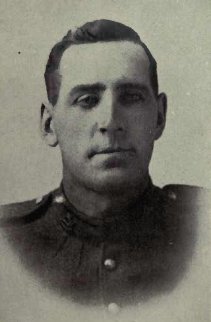James Peter Robertson VC (26 October 1883 – 6 November 1917) was a Canadian recipient of the Victoria Cross, the highest and most prestigious award for valour in the face of the enemy that can be awarded to British and Commonwealth forces.
James Peter Robertson | |
|---|---|
 James Peter Robertson VC | |
| Born | 26 October 1883 Albion Mines, Nova Scotia |
| Died | 6 November 1917 (aged 34) Passchendaele salient, Belgium |
| Buried | Tyne Cot Cemetery, Passchendaele |
| Allegiance | |
| Service | Canadian Expeditionary Force |
| Years of service | 1915 - 1917 |
| Rank | Private |
| Unit | 27th (City of Winnipeg) Battalion |
| Battles / wars | World War I |
| Awards | |
Details
editBorn in Albion Mines (now called Stellarton), Pictou County, Nova Scotia, "Pete", as he was known, lived most of his life in Medicine Hat with his mother.[1]
Robertson enlisted in the Canadian Expeditionary Force in June 1915.[2] He became a private in the 27th (City of Winnipeg) Battalion, Canadian Expeditionary Force. Robertson was 34 years old, during the Second Battle of Passchendaele when he performed the following deed for which he was awarded the VC.
"For most conspicuous bravery and outstanding devotion to duty in attack. When his platoon was held up by uncut wire and a machine gun causing many casualties, Pte. Robertson dashed to an opening on the flank, rushed the machine gun and, after a desperate struggle with the crew, killed four and then turned the gun on the remainder, who, overcome by the fierceness of his onslaught, were running towards their own lines. His gallant work enabled the platoon to advance. He inflicted many more casualties among the enemy, and then carrying the captured machine gun, he led his platoon to the final objective. He there selected an excellent position and got the gun into action, firing on the retreating enemy who by this time were quite demoralised by the fire brought to bear on them.
During the consolidation Pte. Robertson’s most determined use of the machine gun kept down the fire of the enemy snipers; his courage and his coolness cheered his comrades and inspired them to the finest efforts.
Later, when two of our snipers were badly wounded in front of our trench, he went out and carried one of them in under very severe fire.
He was killed just as he returned with the second man." (London Gazette, no.30471, 11 January 1918) [3]
Further information
editRobertson is buried at Tyne Cot Cemetery, Passchendaele, Belgium, located 5 miles north east of Ypres. (Plot LVIII. Row D. Grave 26).
The medal
editHis medal is now located in the Canadian War Museum.
Legacy
editOn 10 February 2011, the Department of Fisheries and Oceans announced that the nine new vessels in a new class of midshore patrol vessels would be named Hero-class patrol vessels.[4][5][6] One of the new vessels will be named the CCGS Private Robertson V.C..
Robertson Lake near Wood Buffalo National Park is named after him.[7]
A CPR station in Calgary was named Robertson Railway Station when established around 1917. It no longer exists.[8]
See also
editReferences
edit- ^ Edmonton Bulletin, Nov. 29, 1919
- ^ Canadian Great War Project
- ^ see also National Defence and the Canadian Forces, Victoria Cross Bios Archived 2018-07-10 at the Wayback Machine
- ^ "Harper Government Names New Coast Guard Vessels in Honour of Canadian Heroes". Canada News Service. 2011-02-10. Archived from the original on 2012-03-27. Retrieved 2020-01-30.
- ^ Bryin Weese (2011-02-09). "Fallen Heroes to be honoured with namesake ships Thursday". Toronto Sun. Archived from the original on 2012-10-01.
- ^ "Canadian Coast Guard's "Hero Class" Of Vessels". Department of Fisheries and Oceans. 2011-02-10. Archived from the original on 2012-10-24.
- ^ Eric and Patricia Holmgren, Place Names of Alberta, p. 157; Karamitsanis, Place Names of Alberta, volume 4
- ^ Karamitsanis, Place Names of Alberta, volume 2
Further reading
edit- Monuments to Courage (David Harvey, 1999)
- The Register of the Victoria Cross (This England, 1997)
- VCs of the First World War - Passchendaele 1917 (Stephen Snelling, 1998)